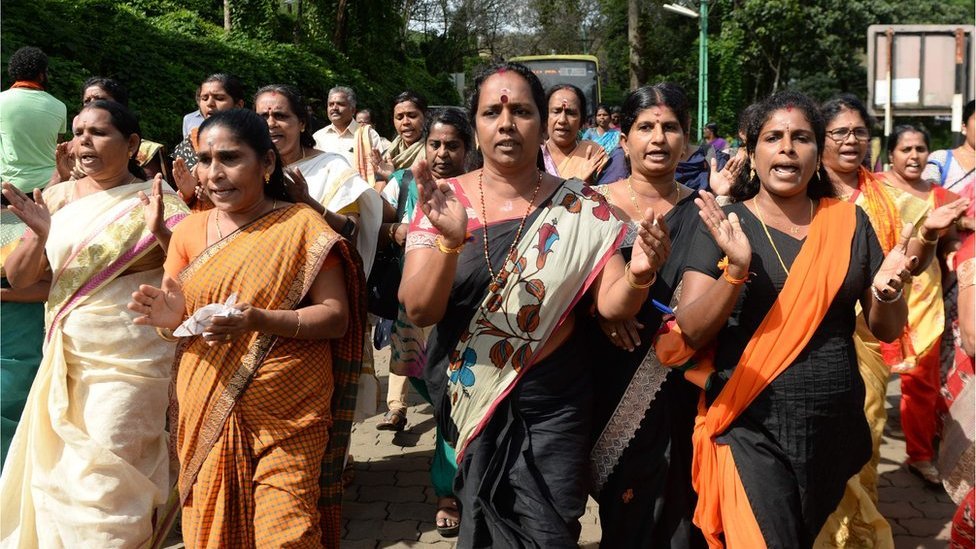
Image copyrightGetty ImagesImage caption Many of those protesting against women entering the temple are women themselves It's been more than a month since India's Supreme Court revoked a ban on women aged between 10 and 51 entering a prominent Hindu temple in southern India.
Yet no women have been able to enter so far.
The Sabarimala temple in Kerala state officially opened its gates on Friday evening, the start of the annual pilgrimage season.
The temple had also opened for a few hours twice after the court verdict.But ever since the ban was repealed, tens of thousands of protesters, including many women, have blocked roads, attacked female devotees and vandalised property in a bid to stop women from entering the shrine.
They say that they are protecting their deity in accordance with an age-old belief that women of a menstruating age are a threat to his celibacy.
A debate around this has been raging in the rest of the country as well.
We asked two writers, with different viewpoints, to explain their stand.
These are selected excerpts:
The 'feminist' ruling angering the women it meant to empowerShyam Krishnakumar, commentatorEquality cannot become a premise to create an artificial homogeneity, forcing a conformity that destroys diverse, intergenerational practices, which enjoy the support of all stakeholders, including women.
No efforts are taken to sincerely engage with the practices of the actual stakeholders.
What masquerades under the garb of "reform" is a way to impose modernity on native practices by judicial writ and state force if necessary.
The judgement has also raised disturbing questions about the relationship between religion and state in India.
The government has become increasingly involved in managing religious institutions and the judiciary in determining "correct" religious practice.
Image copyrightKaviyoor SanthoshImage caption Sabarimala is one of the most prominent Hindu temples in the country The stand-off at Sabarimala exposes the stark dichotomy between a cosmopolitan elite who celebrate the "liberation" of women and the visceral grassroots reaction from millions of women devotees who feel their voices are not being heard in today's India.Kerala is not a place where women are voiceless.
It has historically been a matrilineal society where women have controlled and inherited property for centuries.
The state has the highest literacy rate in India and its social indicators are comparable to developed countries.
The protesting women feel that no one cared to understand their worldview.
They feel that those with privilege and a voice are imposing a "liberation" that these women do not seek.
Read the full article here
To ban women from Sabarimala is yet another form of 'victim-shaming'Devika J, historian and social commentatorAs someone who lives in Kerala, I can vouch that misogyny here is just as toxic as anywhere else in India.
The myth that Kerala is a matrilineal society and that women here enjoy freedom and equal rights has been a persistent one.
This myth has continued to circulate despite a rising mountain of evidence against that rosy picture.
Critics often cherry-pick facts to suit their arguments.
Image:A TheIndianSubcontinent team was forced to leave as protests turned violent.In this debate, feminists in Kerala and elsewhere who have publicly supported the court verdict have been told that they are too "elite" to do so and their concerns are ultimately too cosmopolitan to represent marginalised women and devotees.
But the same critics have no problem putting privileged and elite women forward to make their arguments sound more convincing.But all women - elite or not - should oppose the belief that they must be barred from the Sabarimala temple to protect the deity's celibacy.
Isn't the reasoning employed here very similar to the one used to victim-shame survivors of rape and sexual harassment - that their attire or their presence provoked their attackerIf such a belief is being peddled as tradition, it is important for everyone in a democratic society to strongly oppose it.
Read the full article here

 9
9







